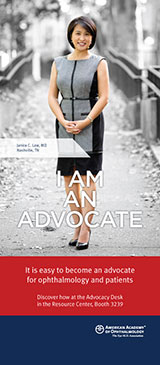 Tennessee House Bill 555 and its companion, Senate Bill 220, would allow optometrists to inject local anesthesia into the eyelid to perform surgery to remove lesions. However, the appropriate training for optometrists to perform these surgical procedures with injectable anesthesia is lacking. This is a patient safety issue — but this may not be apparent to public policy makers — unless you educate them.
Tennessee House Bill 555 and its companion, Senate Bill 220, would allow optometrists to inject local anesthesia into the eyelid to perform surgery to remove lesions. However, the appropriate training for optometrists to perform these surgical procedures with injectable anesthesia is lacking. This is a patient safety issue — but this may not be apparent to public policy makers — unless you educate them.
I never dreamed that I would be looking a scope-of-practice bill right in the face. I learned of it happening to other states and didn’t think it could happen to my state. But reality hit last spring in Tennessee. Ophthalmology was not going to have enough votes against HB 555. Are we really going to lose and place our patients’ safety and quality of surgical care at risk?
Panicking, many of my colleagues and I quickly studied whom we needed to educate on the Tennessee Senate and House committees considering the bills. We made appointments to meet lawmakers in their offices, to urge them to keep citizens of Tennessee safe by not passing HB 555 and SB 220. The questions in the back of my mind were: why hadn’t we done this sooner and why were we just now meeting for the first time? We were lucky to have been able to get our message across.
Educate others and promote surgery by surgeons
Residents and medical students from Vanderbilt Eye Institute joined me at the state capital to show our opposition to the bill. We handed out brochures explaining the differences in training between optometrists and ophthalmologists. The residents were able to speak about the rigors of training, the numbers of cases it takes to be competent, and the levels of supervision it requires to learn to troubleshoot any unexpected scenarios. Fortunately, with strength in numbers and momentum from the ophthalmology community, this bill was tabled for the legislative year.
Build relationships early — it’s easy
How can you make a difference? How do you get people to hear you? I learned through this process how important it is to build relationships with the community, build relationships with your patients to spread the word and build relationships with the lawmakers — early. And if you do it during a time of peace, you won’t be meeting them for the first time when it is just four days away from the final vote. It does take time out of our busy schedules, but it is critical for keeping our patients safe.
Donate when you can’t be there physically
We are all extremely busy and it is difficult to find the time to meet your legislators. There are other options: donate directly to legislators’ campaigns and to your state PAC and the Academy’s OPHTHPAC® fund. In addition, make a yearly contribution to the Surgical Scope Fund. This fund provides states with the necessary resources to successfully battle and derail optometric-surgery initiatives that pose a threat to our patients’ safety and quality of surgical care. Tennessee and other states directly benefited from the fund during their battles last year. The plain fact is that we must give to all of the above!
Attend Congressional Advocacy Day
I first participated in Congressional Advocacy Day in Washington, D.C. in 2006 as a resident ambassador. I have continued to attend ever since. By participating, my eyes were opened to the political process. It was a valuable experience to participate alongside other ophthalmologists and engage in the process of educating members of Congress about our profession.
Join me in keeping our patients safe and upholding the quality of eye care to patients
If you care about patients receiving quality eye care, please join me in educating the community by building relationships with lawmakers and donating to the funds that can make a difference to our patients and to our field.
Janice C. Law, MD, is a vitreo-retinal surgeon and an assistant professor at Vanderbilt University Medical Center.